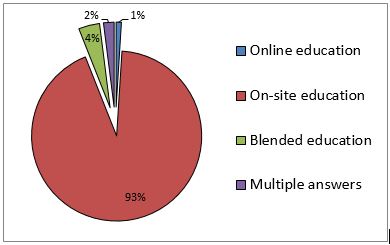|
The initial goals of this study were to identify student
preferences regarding EFL courses and to visualize the level of
credibility of three different types of EFL courses within the
Ecuadorian market.
In order to collect data, 950 EFL students from five different
universities were surveyed. Age was used as the criteria to diversify
the answers and very little attention was given to the level of English
students were studying.
Two questions were asked:
- How do you prefer to learn English?
- How do you think you can learn English better?
Respondents were given three options:
- online education
- on-site education
- blended education
Figures 1 and 2 show survey results:
How do you prefer to learn English?

Figure 1. Responses to question 1.
How do you think you can learn English better?

Figure 2. Responses to question 2.
The findings were overwhelmingly evident in the high level of
preference and credibility for on-site education when compared with the
other two types of education: 93% and 94% of the answers favored on-site
education (for questions 1 and 2, respectively). When the data were
differentiated by age, an interesting discovery arose: Even the youngest
less than 17 years old) surveyed group did not prefer or believe
strongly in online education. Only 2% of the respondents within this group believed they
could learn better through online EFL courses.
The following factors were detected as possible reasons for
this resistance to online courses: cultural factors (teacher’s high
level of authority, respect, and credibility), Internet accessibility
(lack of/unreliability), previous educational experiences, historical
tendencies in education, and the level of autonomous learning.
As a second phase, I plan to link these possible reasons with
student preferences and beliefs in order to analyze in detail the
current behavior of EFL students in Ecuador and be able to accurately plan future project
language courses according to the market trends and students’ preferences.
The results of this study are intended to be applied to improve credibility levels in online and blended EFL programs by identifying their strengths and weaknesses, to be used as statistical information for teacher trainers, and, finally, to be implemented in future marketing studies for publishers in Ecuador.
Mr. Andres Paredes Becerra has worked in the education field both as an instructor and administrator since 1994. He cowrote the series The Academic Books One, Two, Three, and Four. He is one of the authors of the current EFL curriculum for the national school system (K-12) implemented by the Ecuadorian Ministry of Education. He has been the general academic coordinator at CEC-EPN since 2003.
| 
